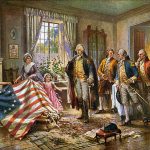Today, schoolchildren across America are reciting the stirring words of Martin Luther King, Jr.’s “I Have a Dream” speech. Nearly everyone knows Martin Luther King, Jr. as the great leader of the civil rights movement in America who espoused a philosophy of non-violent opposition to racial discrimination and segregation; fewer recognize King’s contribution to the natural law tradition of American constitutionalism.
As we honor Martin Luther King, Jr., the Witherspoon Institute is proud to announce a public preview of a new online academic resource dedicated to natural law and the American tradition. Today is an apt occasion to learn more deeply about that great tradition, to which, King said, we are the heirs through the “magnificent words” of the “architects of our republic.”
The aim of the Witherspoon Institute’s project is to create a nonpartisan, educational website on “Natural Law, Natural Rights, and American Constitutionalism,” which will serve as an online resource center for students, teachers, and educated citizens to learn about the intellectual traditions of natural law and natural rights, particularly within American political and constitutional history.
The project is made possible through the support of the National Endowment for the Humanities through its “We the People” initiative and with direction from scholars associated with the James Madison Program in American Ideals and Institutions at Princeton University. The goal of the NEH “We the People” initiative is to encourage and strengthen the teaching, study, and understanding of American history and culture through the support of projects that explore significant events and themes in our nation’s history and culture, which advance knowledge of the principles that define America.
Start your day with Public Discourse
Sign up and get our daily essays sent straight to your inbox.The resources of Natural Law, Natural Rights, and American Constitutionalism are arranged into five categories:
- Classical and Medieval Sources of Natural Law
- Early Modern Liberal Roots of Natural Law
- American Founding and Constitutionalism
- Contemporary Theories of Natural Law
- Critics of the Natural Law Tradition
We have been honored to have the participation of many distinguished scholars in order to bring the project to fruition. The following is a list of the scholars who have collaborated in the project, and the essays that they have contributed (for a complete list of our contributors, please click here):
- Platonic Philosophy and Natural Law
V. Bradley Lewis, Catholic University of America - Aristotle, Natural Law, and the Founders
Michael Pakaluk, Ave Maria University - Cicero and the Natural Law
Walter Nicgorski, University of Notre Dame - Aquinas’s Theory of Natural Law
Thomas D. D’Andrea, University of Cambridge - Ockham to Hooker: Late Medieval Transformations of Natural Law
Paul E. Sigmund, Princeton University - Hobbes: Natural Law to Natural Rights
Robert Kraynak, Colgate University - Locke and the Natural Rights Tradition
Steven Forde, University of North Texas - Natural Law and the Law of Nations
Samuel Gregg, Acton Institute - Montesquieu: Natural Law and Natural Right
Paul A. Rahe, Hillsdale College - Common Law and the Law of Reason
James R. Stoner, Louisiana State University - English Radical Whigs and Natural Law
Michael Zuckert, University of Notre Dame - Colonial Roots of American Constitutionalism
Lee Ward, University of Regina - The Declaration of Independence
James R. Stoner, Louisiana State University - Constitution-Making in the Founding Era
John Dinan, Wake Forest University - The Bill of Rights and Natural Rights
Thomas Pangle, University of Texas at Austin - The Influence of the Scottish Enlightenment
Daniel N. Robinson, University of Oxford - Lincoln and the Natural Law Tradition
Herman Belz, University of Maryland emeritus - The Post-Civil War Amendments
Michael Zuckert, University of Notre Dame - Natural Law and the Supreme Court
Paul Moreno, Hillsdale College - American Civil Rights Movements
William B. Allen, Michigan State University emeritus - New Natural Law Theory
Christopher O. Tollefsen, University of South Carolina - Modern Constitutionalism
Walter Berns, Georgetown University emeritus - Machiavelli, Guicciardini, and Raison d’Etat
Maurizio Viroli, Princeton University - Enlightenment Critics of Natural Law
Darren Staloff, CCNY, and Alan M. Levine, American University - Social Darwinism and Natural Law
Bradley C. S. Watson, St. Vincent College - American Progressivism
Ronald J. Pestritto, Hillsdale College - Oliver Wendell Holmes
Bradley C. S. Watson, St. Vincent College - Natural Law and Legal Positivism
James B. Murphy, Dartmouth College
In this public preview, you will find the website in its first phase. We continue to receive and edit new essays and educational materials, acquire facsimiles of primary sources, and improve technical aspects of the website.
No resource of this kind currently exists; considering the importance of the natural law tradition to American constitutionalism, therefore, we are certain that this endeavor will prove a worthwhile investment of time and effort.
We hope that you will visit Natural Law, Natural Rights, and American Constitutionalism 1.0 and we welcome your comments and suggestions regarding the site. Please contact our editorial staff at nlnrac@winst.org with comments or queries.














